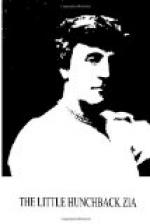“Go not forth with thine eyes bent downward on the dust. Lift them, and look long at those from whom thou askest alms. Lift them and look as I see thee look at the sky when thou knowest not I am near thee. I have seen thee, hunchback. Gaze at the passers-by as if thou sawest their souls and asked help of them.”
She said it with a fierce laugh of derision, but when in his astonishment he involuntarily lifted his gaze to hers, she struck at him, her harsh laugh broken in two.
“Not at me, hunchback! Not at me! At those who are ready to give!” she cried out.
He had gone out stunned with amazement. He wondered so greatly that when he at last sat down by the roadside under a fig-tree he sat in a dream. He looked up at the blueness above him as he always did when he was alone. His eyelids did not seem heavy when he lifted them to look at the sky. The blueness and the billows of white clouds brought rest to him, and made him forget what he was. The floating clouds were his only friends. There was something—yes, there was something, he did not know what. He wished he were a cloud himself, and could lose himself at last in the blueness as the clouds did when they melted away. Surely the blueness was the something.
The soft, dull pad of camel’s feet approached upon the road without his hearing them. He was not roused from his absorption until the camel stopped its tread so near him that he started and looked up. It was necessary that he should look up a long way. He was a deformed little child, and the camel was a tall and splendid one, with rich trappings and golden bells. The man it carried was dressed richly, and the expression of his dark face was at once restless and curious. He was bending down and staring at Zia as if he were something strange.
“What dost thou see, child?” he said at last, and he spoke almost in a breathless whisper. “What art thou waiting for?”
Zia stumbled to his feet and held out his bag, frightened, because he had never begged before and did not know how, and if he did not carry back money and food, he would be horribly beaten again.
“Alms! alms!” he stammered. “Master—Lord—I beg for—for her who keeps me. She is poor and old. Alms, great lord, for a woman who is old!”
The man with the restless face still stared. He spoke as if unaware that he uttered words and as if he were afraid.
“The child’s eyes!” he said. “I cannot pass him by! What is it? I must not be held back. But the unearthly beauty of his eyes!” He caught his breath as he spoke. And then he seemed to awaken as one struggling against a spell.
“What is thy name?” he asked.
Zia also had lost his breath. What had the man meant when he spoke of his eyes?
He told his name, but he could answer no further questions. He did not know whose son he was; he had no home; of his mistress he knew only that her name was Judith and that she lived on alms.




